Loneliness: The Silent Pandemic
All Together. All Connected. But All Isolated, Separated and Alone
The message is clear: We must create a path to human connection and interaction, if we care about humanity, civility, health and wellbeing.
Lest it has been forgotten, artificial/virtual relationships aren’t the cure for loneliness - they’re a symptom of it.
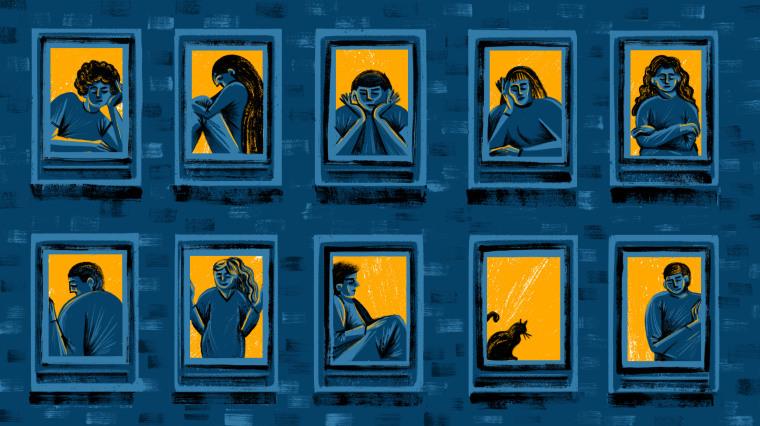
Illustration by Chloe Cushman. Photo credit:NBC News
Preface
From time immemorial the yearning for meaningful and shared togetherness has always been powerful. This is what makes us human.
But, today, in this digital/virtual world, I am worried about lonely educators and students, lonely politicians and lonely economists, lonely technology/ IT/computer games designers and developers, lonely children and lonely youth, lonely nurses and doctors, lonely artists and filmmakers, lonely parents and grandparents,...lonely people everywhere…beautifully summed up by the Beatles in Eleanor Rigby:
All the lonely people
Where do they all come from?
All the lonely people
Where do they all belong?
The loneliness epidemic is the blight on our humanity
Rethinking Loneliness: Harnessing New Approaches
A retired academic economist trying to explain how modern life is making us so lonely.
This Blog is a humble attempt, a heart-felt offering from a retired academic economist, based on his life journey, experiences, discoveries and more, explaining how modern life is making us lonely, and how we may begin a journey of self-discovery and healing.
You may, quite understandably, ask, why would someone who has devoted years and years of his adult life to the study and teaching of economics could or should write a piece of this nature about loneliness, isolation and their associated pain, hurt and misery? Isn’t it a bit strange, a kind of a radical departure from the concerns of economists to focus on a subject that on the face of it has nothing to do with our economics, economy or business conditions and environment? You may still ask, does it even matter for our economy whether we are lonely? Given my life journey, ups and downs, sadness and joy, darkness and light, I firmly believe that it matters profoundly, as I sincerely believe that any economist without a life journey, with no real life experiences, without a story to tell, cannot really be a best communicator and teacher, proposing policies and new approaches of meaning and purpose.
To my mind, our common good is enhanced by economic arrangements in which cooperation and collaboration trump competition, whilst selflessness and aultruism triumphs over individualism, selfishness and greed. This means pretty much doing the opposite of what neoliberalism has championed.
I have explained in more detail and elaborated more on why I am concerned about economics, loneliness and more in the following three links, amogst others:
Wouldn’t the world be a better place with a bit more kindness? Harnessing the Economics of Kindness
Is Neoliberal Economics and Economists 'The Biggest Fraud Ever Perpetrated on the World?'
What if Universities Taught KINDNESS?
Finally, when I retired from teaching in the early 2000s, I was feeling very lonely, isolated and alone, struggling to find the new me!
As many people, wiser than me have noted, our lives and the world in which we all live, are so unpredictable. Things happen suddenly, unexpectedly. We want to feel we are in control of our own existence. In some ways we are, in some ways we're not ... Life can bring you so much joy and yet at the same time cause so much pain…and then..., I felt so lonely… And now, once again, the loneliness that I am feeling so deeply since my wife’s stroke in August last year.
A Word of Thanks to my Family, Friends and Colleagues who have Empowered me to Feel Loved and not Alone
A couple of years later after my retirement, I founded the GCGI at an international conference which was held in Oxford in 2002. I am most grateful for the continued support, love, generosity and kindness of my family, friends and colleagues who with their love, friendship, cooperation and collaboration have enabled me to found a movement for the common good which we can all together justifiably be very proud of. They have also equally been amazing since Annie’s stroke, true examples of real connections, rather than digital/virtual friendship.
Nota bene
Neoliberalism, an economic ideology devoid of any human and spiritual values, combined with the rise of loneliness and isolation in this so-called digital age, have together destroyed our humanity, who we are and how we live our lives.
What are we to do? How may we embrace economic progress and new technologies, without harming ourselves, controlled and manipulated by them? How may we use them as tools of betterment, creating a better and more contented lives, building a better world, a world of harmony and prosperity for all, away from fear, insecurity, anxiety, rat race, isolation and loneliness?
ALONE TOGETHER
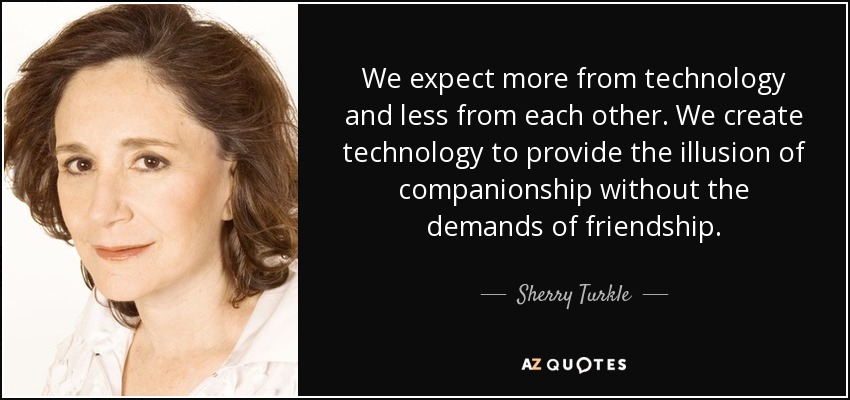
“Technology is seductive when what it offers meets our human vulnerabilities. And as it turns out, we are very vulnerable indeed. We are lonely but fearful of intimacy. Digital connections offer the illusion of companionship without the demands of friendship…We already filter companionship through machines; the next stage is to accept machines as companions. Soon, robots will be employed in “caring” roles, entertaining children or nursing the elderly, filling gaps in the social fabric left where the threads of community have frayed. Meanwhile, real-world interactions are becoming onerous. Flesh-and-blood people with their untidy impulses are unreliable, a source of stress, best organised through digital interfaces – BlackBerries, iPads, Facebook. We start with the illusion that technology will give us control and end up controlled. We get Blackberries to better manage our email, but find ourselves cradling them in bed first thing in the morning and last thing at night.” - Sherry Turkle, Author of ALONE TOGETHER
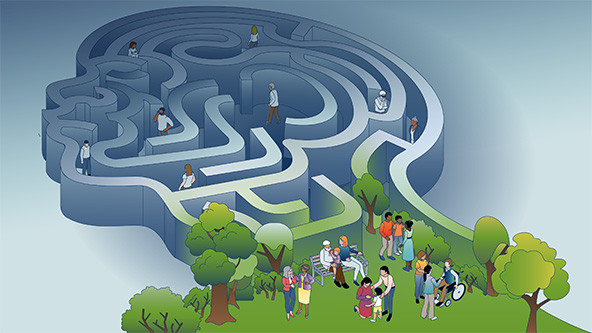
Illustration by the Robert Wood Johnson Foundation/via Stanford Social Innovation Review, Stanford University
‘Current global estimates suggest that 1 in 4 older adults experience social isolation, and 5 to 15 percent of adolescents experience loneliness. Weak social connections cause a higher risk of early death; these are also linked to anxiety, depression, suicide, dementia, and the increased risk of cardiovascular disease and stroke. Weak social connections represent an equivalent health risk to smoking and obesity.’
The US psychotherapist Carl Rogers once wrote that when his clients came to a full realisation of who they were, it was always to appreciate that they were not individuals, but members of groups, networks, families, organisations and communities. A sense of a social identity, it turns out, makes a more powerful and enduring contribution to our mental and emotional wellbeing than a sense of personal identity, something that the modern, monetised and values-free modern-word is championing.
The Time is Now to Reclaim Our Brains and our Minds from Big Tech

Photo credit: sleepFoundation
'The smartphone is a recent enough innovation (the first iPhone was launched in 2007) to limit firm conclusions about effects of its use. But there is evidence of sudden, steep rises in depression, anxiety and other mental health problems in the first generation to pass through adolescence in a state of digital saturation.'- The Guardian Editorial
The Teen Mental Illness Epidemic is International
Sure, people were solitary before, choosing solitude, living as hermits for spiritual enrichment,— since Paul of Thebes, commonly known as Paul the First Hermit, in the third century, religious hermits secluded themselves in deserts and forests — but they weren’t lonely. Solitude and loneliness are totally a different mindset, lest we forget.
‘Solitude expresses the glory of being alone, whereas loneliness expresses the pain of feeling alone.’- Paul Tillich
“[Loneliness] transcends borders and is becoming a global public health concern affecting every facet of health, wellbeing and development…Social isolation knows no age or boundaries.”
The World Health Organisation (WHO) declares loneliness a ‘global public health concern’
Our Epidemic of Loneliness and Isolation
We think loneliness is in our heads, but its source lies in the ruin of civil society
‘Too much of contemporary discussion about the impact of social and technological changes on people’s psychology – from the influence of social media on the wellbeing of the young to the effect of hyper-individualism on our sense of self – fetishises the psychology at the expense of social analysis. We look for loneliness inside our heads when its source lies all around us, in the destruction of collective life, the erosion of communal bonds, the ruin of civil society, the squeezing of public spaces. We could do with obsessing less about personality types than about the obsession with the psychological at the expense of the social.’
Until not too distant past, almost no one lived alone; no one had ever heard or knew about the epidemic of loneliness, but now loneliness has blighted many lives, as we struggle with the pain and consequences of our lonely life and existence, in this world of virtual living, virtual connections and virtual friendship, likes and dislikes. How did modern life get so lonely?
As it has been noted by many observers studying ‘Loneliness’, the modern concept of loneliness, as an emotional state distinct from physical solitude, did not emerge until the 1800s. The birth of loneliness can be linked to major demographic, economic and spiritual shifts: the industrial revolution and the mass migration from agrarian, face-to-face communities to big cities, rising individualism, defined by a toxic belief in self-organising markets, and the rise of I, Me culture as opposed to We, Us culture. More on these as we continue reading this posting.
In recent decades the number of people who complain of loneliness has skyrocketed. Bound Alberti, the author of a new book, A Biography of Loneliness identifies and examines a number of trends that have played a role in this. She explores the loneliness of widowhood and singledom in a culture that still upholds the romantic ideal of a “soul mate”; the loneliness of young people – among the loneliest groups in Britain – who are finding that social media connections and online community are poor substitutes for the richness and reciprocity of real-life community; the loneliness of the old and infirm; the loneliness of the poor; the loneliness of the homeless and of refugees. She writes too of the transient loneliness that can feel painful but can also be beneficial, a source of creativity or of personal growth.
It is not coincidental that loneliness is often closely associated with poverty. Bound Alberti’s writing, as Sophie McBain, associate editor of the New Statesman has so eloquently observed, ‘is most impassioned when she discusses how neoliberal politics – laissez-faire government, economic austerity, competitive individualism and the consumerist message that we can buy our way out of spiritual discontent – has created the conditions for widespread loneliness. The wealthy can be lonely too, but they are less affected by the government’s swingeing funding cuts to community centres and libraries, council housing and social care…’.
This observation on neoliberalism and loneliness very much resonates with my own research and writings:
One of the greatest destructive consequences of the neoliberalism’s folly is, to my mind, its championing of fear, despair and mistrust, whilst celebrating individualism, ‘I and Me’ culture at the expense of ‘We and Us’ culture, affecting the whole fabric of societies and c communities, leading to an epidemic of loneliness and extreme sadness.
Neoliberalism and the rise in global loneliness, depression and suicide
The Destruction of our World and the lies of Milton Friedman
Who Am I in this Market-Based and Money-Driven World?
 Photo credit: The British Psychological Society
Photo credit: The British Psychological Society
As early as January 2011, based on my own experience of observing my students at different universities that I had the privilege of teaching, witnessing their loneliness, unhappiness, pain and agony, I wrote a piece on Why Happiness Should be Taught at Our Universities.
See also: An Open Letter to University Leaders: Students’ Mental and Emotional Wellbeing Must Be Our Priority
These were followed by many more postings, which I have noted a selection below:
Has loneliness become the new normal?
What Can I teach my students in the age of Selfie, Isolation, Virtual friendship and loneliness?
Good on you Ms. Essena O'Neill: Social media 'is not real life'
Student Suicides at Bristol University: My Open Letter to the Vice-Chancellor, Prof. Hugh Brady
Eruption of anxiety, depression and suicide in Britain
“In a world where you can be anything, be kind.”
Adam Smith and the Pursuit of Happiness
Now I wish to draw your attention to the following eloquent and meaningful reflection on loneliness and its consequences from a senior medical practitioner:
US surgeon general Vivek Murthy: ‘Loneliness is like hunger, a signal we’re lacking something for survival’
‘There is good reason to be concerned about social connection in our current world. Loneliness is a growing health epidemic. We live in the most technologically connected age in the history of civilization, yet rates of loneliness have doubled since the 1980s… Additionally, the number of people who report having a close confidante in their lives has been declining over the past few decades. In the workplace, many employees — and half of CEOs — report feeling lonely in their roles.
During my tenure as U.S. surgeon general, I saw firsthand how loneliness affected people of all ages and socioeconomic backgrounds across the country. I met middle and high school students in urban and rural areas who turned to violence, drugs, and gangs to ease the pain of their loneliness. I sat with mothers and fathers who had lost sons and daughters to drug overdoses and were struggling to cope alone because of the unfortunate stigma surrounding addiction. And I met factory workers, doctors, small business owners, and teachers who described feeling alone in their work and on the verge of burnout.
During my years caring for patients, the most common pathology I saw was not heart disease or diabetes; it was loneliness. The elderly man who came to our hospital every few weeks seeking relief from chronic pain was also looking for human connection: He was lonely. The middle-aged woman battling advanced HIV who had no one to call to inform that she was sick: She was lonely too. I found that loneliness was often in the background of clinical illness, contributing to disease and making it harder for patients to cope and heal…’-US surgeon general on the epidemic of loneliness and the healing power of family and friends
The loneliness epidemic: In this age of the so-called ‘Social Media’ we're more supposedly ‘connected’ than ever - but why are we so alone, so lonely, friendless and isolated?
It’s time to rethink what loneliness is, what it means and what it entails
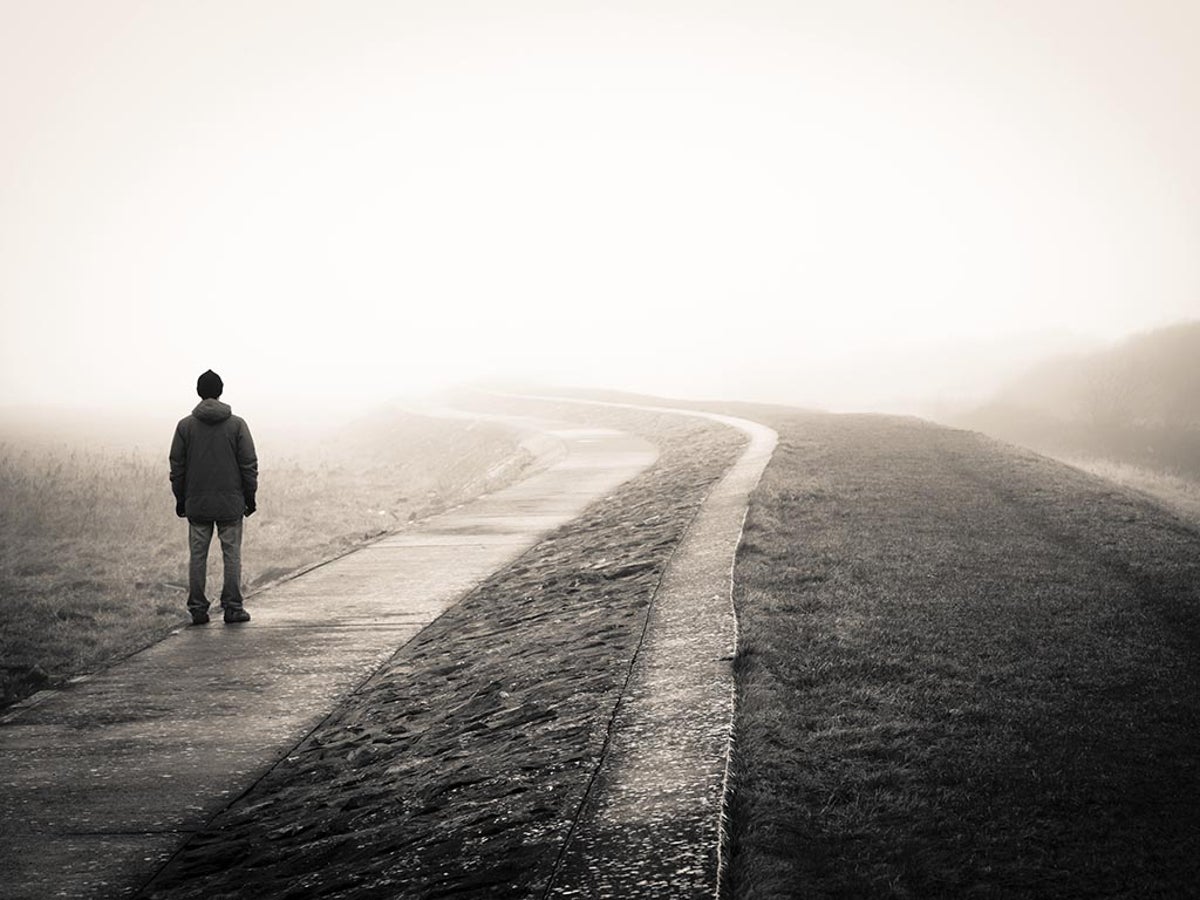
Photo credit: The Independent
N.B. I am delighted and indeed honoured and proud that the GCGI has, since its inception, all those years ago, been at the forefront of activities to highlight the rise in the loneliness epidemic and to champion the values and teachings that may empower and enable us to build a better life of hope, beauty, joy, laughter and happiness, via the implementation of our cherished values.
The Values of the GCGI which we hold very dearly
We value caring and kindness
We value passion and positive energy
We value service and volunteerism
We value simplicity and humility
We value trust, openness, and transparency
We value values-led education
We value harmony with nature
We value non-violent conflict resolution
We value interfaith, inter-civilisational and intergenerational dialogue
We value teamwork and collaboration
We value challenge and excellence
We value fun and play
We value curiosity and innovation
We value health and wellbeing
We value a sense of adventure
We value people, communities and cultures
We value friendship, cooperation and responsibility.
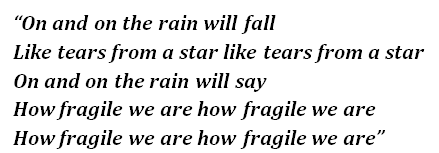
Words from Sting’s “Fragile” song. Photo: Song Meanings and Facts
The loneliness epidemic: In this age of the so-called ‘Social Media’ We're more ‘connected’ than ever - but why are we so alone, so lonely, friendless and isolated?
Life Lessons I've Learned in a World of Conflicting Ideas and Aspirations.
These are the times when we desperately need inspiring and healing words of wisdom, hope and beauty.
A Gift from our GCGI archive to help set us free from chaos and despair, so that we may achieve inner peace and spiritual calm, a more generous and rewarding imagination, inspiring and empowering us to take action in the interest of the common good.
Journey to Healing: Let Me Know What is Essential
A Happier and a more Fulfilling and Rewarding Life is Possible
GCGI is our journey of hope and the sweet fruit of a labour of love. It is free to access, and it is ad-free too. We spend hundreds of hours, volunteering our labour and time, spreading the word about what is good and what matters most. If you think that's a worthy mission, as we do—one with powerful leverage to make the world a better place—then, please consider offering your moral and spiritual support by joining our circle of friends, spreading the word about the GCGI and forwarding the website to all those who may be interested.

Photo via amazon.com
